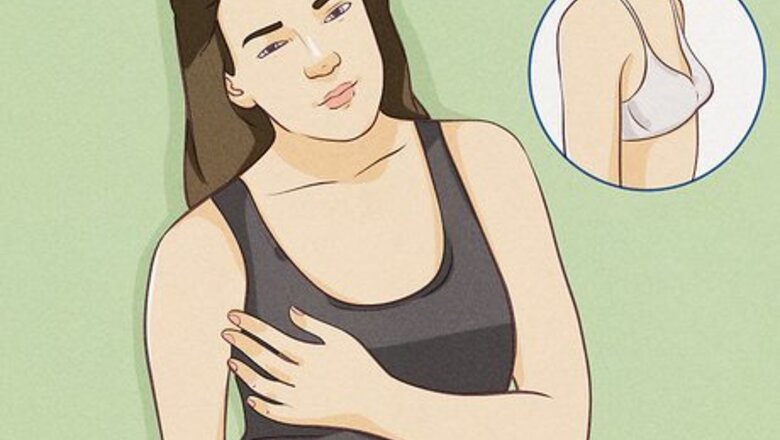
views
Getting the Right Bra
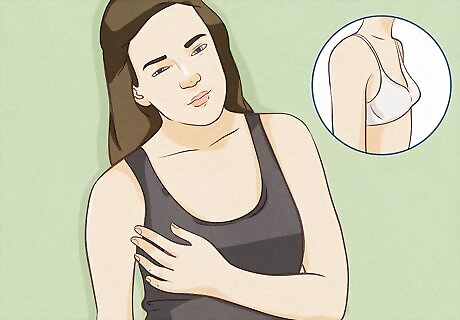
Determine when it’s time to get a bra. Developing breasts during puberty should be an exciting time for you, but since so much is going on with your body, you might be a little scared, and that’s okay. Once your “buds” start to get larger, and possibly pointier, it’s probably time to get your first bra. But the good thing is, there are a lot of different types of bras to choose from. The most important thing about a bra - at any stage in your life - is that it fits properly and is comfortable. A bra is supposed to help give you support and help protect your breasts, they are also great at covering up your breasts and giving your upper body a nice shape that looks good under your clothes.
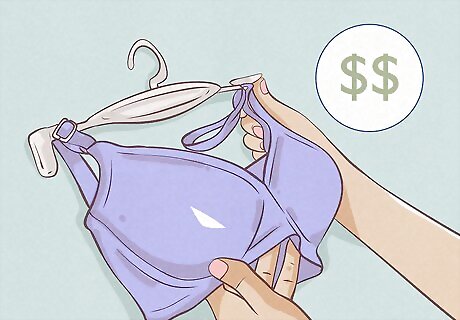
Buy your first bra. Shopping for a bra - at any age - can be a combination of fun and frustration. Bras, like shoes, are made to standard sizes, but those sizes can differ between manufacturers. Therefore, like shopping for shoes, it may take a couple of tries before you find the bra that’s perfect for you.
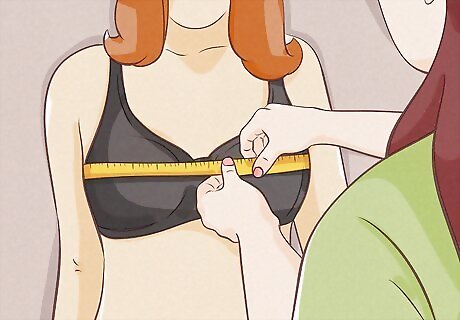
Get a professional bra fitting. While it is possible to measure yourself for a bra at home, it may be a good idea to go to a lingerie or department store if this is your first bra, or if this is the first time you’ve had a proper bra fitting done. When you arrive at the store, tell the sales associate you want to be fitted for a bra. They’ll take you into the change room and measure you in two spots - around your torso, just below your breasts and around the thickest part of your breasts. The first measurement is the “band” measurement and the second is the “cup” measurement. The measurement taken around your torso or chest, just below your breasts, determines the number portion of a bra size (i.e. 32, 34, 36, etc.). The measurement take over the top of your breasts determines the letter portion of a bra size (i.e. A, B, C, etc.), also known as cup size.
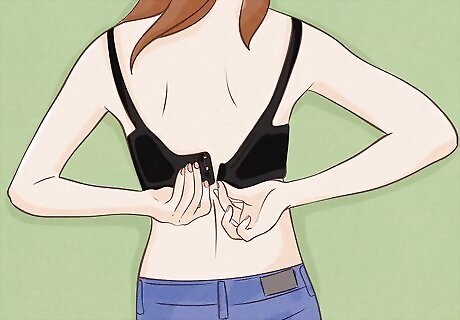
Try on as many bras as you can. Once you’ve been measured for a bra size, the sales person will start to bring you a selection of options to try on. For larger breasted women, the bra size determined during measurement is a starting point. You may need to alter these sizes for different types of bras in order to find the fit that’s perfect for you. In the end, it’s not the size that matters, it’s the fit. Sometimes when you try on a bra you know instantly if it’s good or bad. Other times you’ll try on a bra and just aren’t sure.
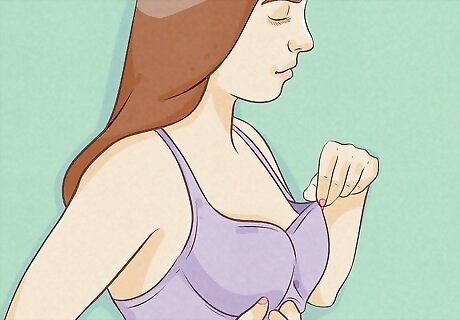
Determine if the bra you’re trying on is a good fit. Sometimes you may try on a bra and can’t decide if it’s a good fit or not. Fear not, there are a number of things you can consider to help you decide if this is the right bra for you. Do the cups of the bra fit smoothly over your breasts? If there are any gaps or wrinkles, the bra is likely too big. If your breasts are overflowing the cups, the bra is too small. Does the centre panel of the bra lie flat against your chest. The portion of the bra that lies between your breasts should lie flat against the bone in that area. If it doesn’t, the bra is too big or too small. Is the portion of the bra that goes under your arms and behind your back straight and parallel to the ground? The bra ‘band’ (the bottom line of a bra) should be straight. It should NOT curve upwards on your back. And the portions of your bra that are behind your back should rest below your shoulder blades. Are the straps digging into your shoulders? Most of the support of your bra should come from the bra itself, not the straps. If the straps are digging into your shoulders, or if only the straps are holding up your breasts, the bra is the wrong size. Do the underwires lay properly under your breasts? Underwires should not poke you, stick out on either end, or pinch your skin. The curves of the underwire should also match the shape of the bottom of your breasts. Do the shape of your breasts look right? The middle of your breasts - when in a bra - should be half way between your elbows and shoulders. And they should point forward, not downwards or to the sides. Does your bra feel comfortable in all positions? Can you walk, sit down and move your arms around and your bra still feels comfortable? Can you easily slide one finger under the band of your bra without it being too tight? If you answered yes to all these questions, you may have found the right bra for you!
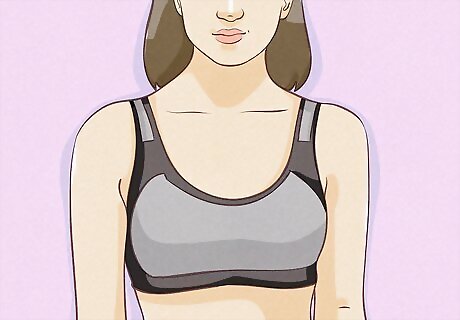
Buy the right sized sports bra. As if everyday bras weren’t hard enough to buy, there’s also sports bras to consider. If you’re in the market for a sports bra, there are several things you’ll want to consider. First off, no sports bra is going to keep your breasts from moving around as your play sports or exercise, but a good fitting sports bra will minimize that movement so it’s comfortable. A sports bra is fitted using the same measurements as any other bra - a band and cup size. If you already know your measurements, great, if not, have someone at the store take your measurements. Once you know your size, you have to determine which style you want. Compression vs. encapsulation. Compression bras literally compress your breast tissue against your body to help prevent significant movement. However, they normally only work for small chested women and for lower impact exercises. Encapsulation bras, on the other hand, have formed cups that can hold larger breasts in place better than compression bras. Racerback vs. wide straps. Racerback straps pull together at the back, which helps provide more support (and prevents the straps from falling off your shoulders). Wide straps, however, distribute the weight of your breasts more evenly across your shoulders. Pullover vs. back clasp. Pullover sports bras are sort of like tank tops, you have to pull them on over your head, or step into them with your feet and pull them up. Because the bra is made of only fabric, there’s no way to make any adjustments to the fit of the bra. Back clasp sports bra have clasps similar to an everyday bra, which is much better for bigger breasts, as it provides much more support.
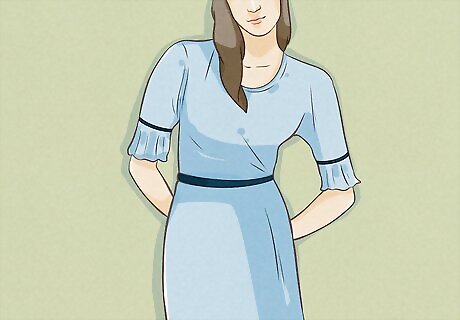
Dress for big breasts. Dressing elegantly when you have big breasts can be difficult. When buying shirts you should look for ones with a longer shape. This longer shape helps to lengthen your upper body and make your waist look smaller - giving you a more even look and balance. Sleeves that are 3/4 length help as well, as they draw the eye naturally away from your larger breasts. Depending on the size of your breasts, you may also want to avoid wearing tops with only spaghetti straps. For the neckline, look for a V shape, or something that has a lower plunge. A lower neckline makes a larger chest look more flattering.
Dealing with Big Breasts Everyday
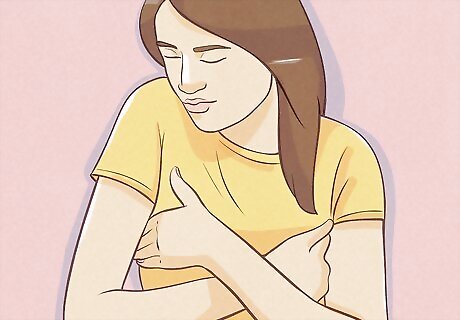
Dispel the myths about your growing breasts. Unfortunately there are a lot of odd myths out there about how breasts develop and whether you have any control over their size. In general, you have no control over when your breasts develop, or what size they’ll end up being. There are no exercises you can do to make your breasts turn out larger or smaller. Breasts are made most of fatty tissue and milk ducts, not muscle. Sleeping on your stomach will not impact your breasts in any way (although if they’re tender, this might be uncomfortable). There is also nothing that a bra can do to make your breasts larger or smaller, even if you wear it at night while you sleep (which is not necessary).
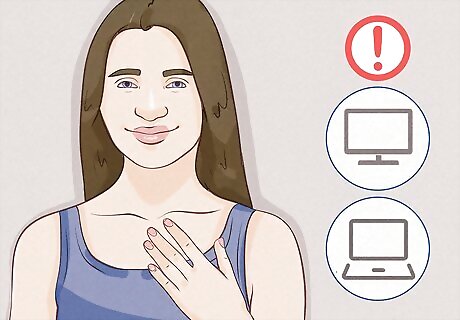
Be proud of your changing body. Developing breasts isn’t something you’re able to hide, for too long. Chances are people other than yourself will eventually notice. You may feel stressed and unsure about these changes and what other people will think of you. These feelings are perfectly normal. Try not to compare yourself to girls you see on TV or the internet. Don’t compare yourself to advertisements - the models in these ads are unrealistic, and most have been photoshopped. You don’t need to look like anyone other than yourself. Remember that you are beautiful, no matter what. And yes, real beauty comes from the inside! If you need to, remind yourself of these things every day. These feelings are normal, so don’t be upset that you feel them. However, even if you’re on an emotional rollercoaster, try not to allow it to affect your health. Eat properly, get plenty of sleep, and exercise regularly. If you’re unable to do one or more of these things, talk to your parents, teacher, school counsellor/nurse, or doctor as soon as you can.
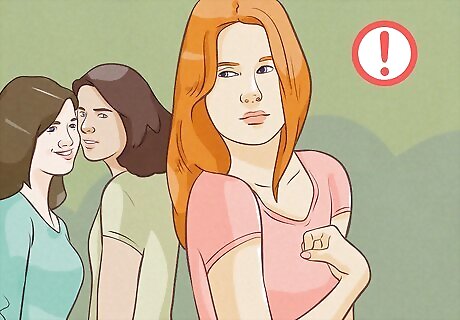
Learn how to deal with teasing or bullying. The age that you go through puberty is usually also an age when you’re becoming aware of how you look and how you fit in. When you body starts to change in all sorts of weird ways, it adds to your stress about what’s normal and what’s not. You parents may at times forget what it was like to be you age and experience all these changes and pressures. This is your chance to remind them, if they haven’t already figured it out. Tell them that what you’re going through isn’t funny and jokes should not be made. At school you may experience other students saying mean things about how you look, or making rude comments about the body parts that are changing. Keep in mind that most of the kids who make these types of comments are insecure themselves, and they’re making these comments out of jealousy and fear. Find a worthwhile role model. Maybe your role model is an older sister, or aunt, or favorite teacher. Someone who doesn’t follow the so-called stereotypes, but want to simply be themselves.
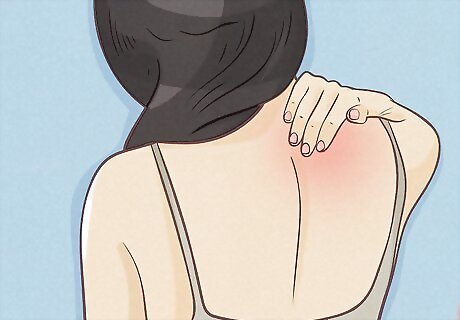
Beware of neck pain. Larger breasts can potentially lead to neck pain. However, it’s not a direct cause and effect situation. It’s not the physical size of your breasts that may cause neck pain, but rather the subconscious things you’re doing because of your breast size that are causing the problem. For example, if your embarrassed about your breasts, you might tend to slouch. And it’s the slouching and bad posture that can lead to neck pain. Sometimes the slouching posture isn’t due to lack of confidence, but to the actual weight of your breasts. If you have large, heavy breasts it can cause you to slump forwards, which in turn causes your neck and back muscles to become painful and can even put your spine out of alignment. Finally, the wrong bra can cause all sorts of problems. If you’re wearing a bra whose straps are digging into your shoulder, it might be causing you to crunch of your neck and shoulders together. This bad posture in turn leads to back and neck pain. Being happy with your breasts will likely make your present yourself with better posture because of your confidence. Getting a better fitting bra could potentially solve some of these problems. Getting large breast implants can actually create some of these problems. It is one of the many things you should consider before deciding to get large breasts via surgery.
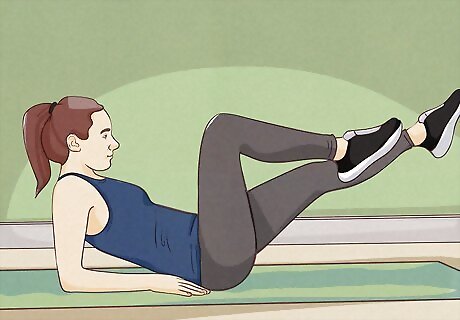
Consider your breast cancer risk. If your breasts have gotten bigger because you’ve gained weight, you may want to consider losing the weight again. Women who gained 30-40 pounds after the age of 18, but before menopause, were 40% more likely to develop breast cancer after menopause. The reason weight gain increases breast cancer risk is because of the increased estrogen hormones present in your body due to the excess fat. Weight gain is also normally related to lack of activity, and lack of activity can also increase your risk of breast cancer. The best way to eliminate this risk is to lose weight before menopause, or immediately after menopause has started. To help reduce your breast cancer risk, and help you lose weight, consider doing moderate to vigorous exercise for 45-60 minutes 5 days a week.
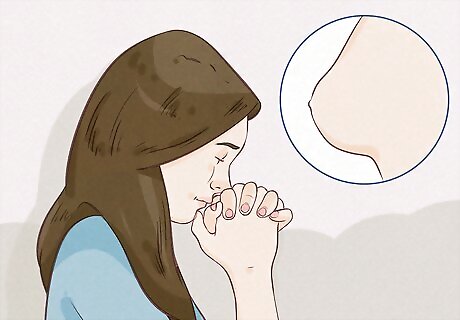
Take care of your mental health. Larger breasts (or uneven breasts) can actually cause some women to experience mental health problems like low self-esteem or eating disorders. A woman’s self image of her breasts can have a huge effect on her self-confidence. Unfortunately there is no physical side effect associated with many of these breast issues, which is why surgery to correct many of these problems are not covered by insurance. But many surgeons have seen a remarkable mental health change in women who have had various breast problems fixed by surgery. If you’re experiencing issues with your breasts that are leading to mental health issues, but not physical issues, they are not less important, and you may wish to consider investigating what surgical options are available to you.
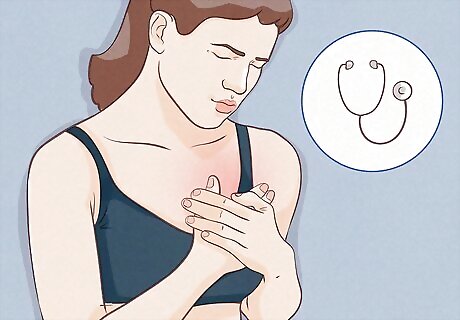
Know when and how to treat breast pain. Breast pain, also known as mastalgia, is actually quite common for all women, regardless of breast size. It can include tenderness, burning sensations, or tightness. It can be relatively mild, or it can be downright torturous. Thankfully most breast pain is not an indicator of any major problems like breast cancer. Most breast pain is caused by hormone levels, the structure and traumatic history of your breasts (e.g. previous breast surgery, etc.), certain medications (e.g. oral contraceptives, fertility treatments, hormone therapy, antidepressants, etc.), and breast size. If you’re experiencing any breast pain that you are concerned about, see your doctor. They can perform a breast exam and consider doing mammograms or ultrasounds to investigate further. Possibly treatments can include: topical anti-inflammatory medication, changes to hormone therapy levels, prescription medications, reduction of medications that are causing the problem, hot/cold compresses, reduced caffeine intake, low-fat diet, etc.












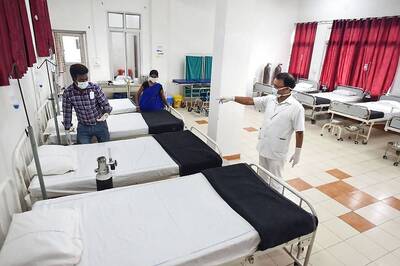




Comments
0 comment